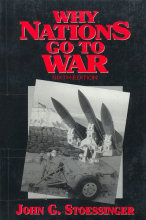
>STOESSINGER : Why nations go to war (előszó)
[1993]
The cold war and the Soviet Union have become history since the fifth edition of Why Nations Go to War appeared. Mikhail Gorbachev, in a few short years, not only transformed his own country; he changed the world. And when a Hitler-like aggressor invaded a neighboring country in 1990 hoping to devour it with impunity, he found an invigorated United Nations, a transformed Security Council, and the superpowers in a united front, unwilling to tolerate his aggression. Saddam Hussein's two wars in the Persian Gulf are the subject of a new chapter in this sixth edition. As in the other six case studies, the focus is on character and personality rather than on mechanistic forces. Saddam Hussein emerges as a single-minded war lover, a modern Nebuchadnezzar who feels truly alive only when engaged in armed conflict.
I first wrote this book in order to transmit an understanding of twentieth-century warfare to my students. Over the past two decades, I have received a multitude of letters from students and teachers all over the world. Many of these contained suggestions for improvement that have found their way into the present edition. Thus this book is more than an updated version of its earlier editions; it now represents a common quest for fundamental answers to the question of why nations go to war.
Wars appear to occur in generational cycles. The war between Catholics and Protestants more than three centuries ago was fought for thirty years. The recent conflict involving the French, Americans, and Vietnamese in Indochina, the struggle between Hindus and Moslems on the Indian subcontinent, and the modern forty years' war fought between Arabs and Israelis in the Middle East—all these appear to have run their course within a single generation.
As I write these lines, it is my fervent hope that future historians will not regard the Middle East the way today's historians regard the Balkans: as a prologue to world war. Accordingly, I hope that my seventh case study will serve as a warning. And I hope too that the present generation, chastened by holocaust and war, may be more determined than its forebears to say no to war.
I would like to thank Don Reisman and Cheryl Friedman of St. Martin's Press for their valuable editorial assistance and Nancy Johnsrud for the excellent copyediting job.
Finally, this book is not the product of teamwork or of a massive research apparatus. It is in essence a product of reflection. In that sense, this is an old-fashioned book, and the ultimate responsibility for both its strengths and its weaknesses is truly mine alone.
John G. Stoessinger